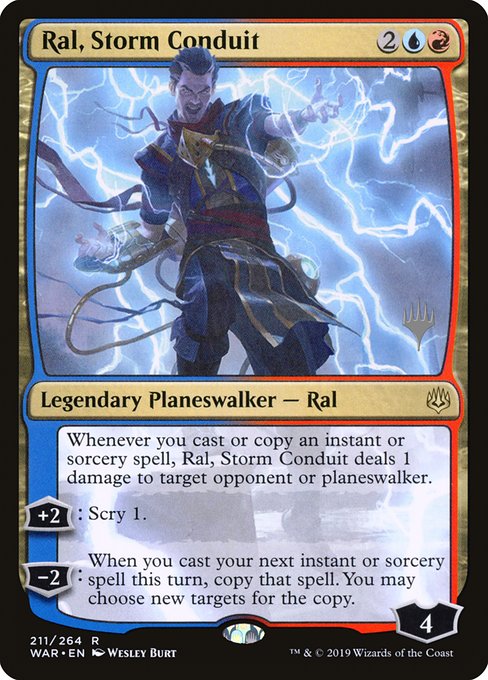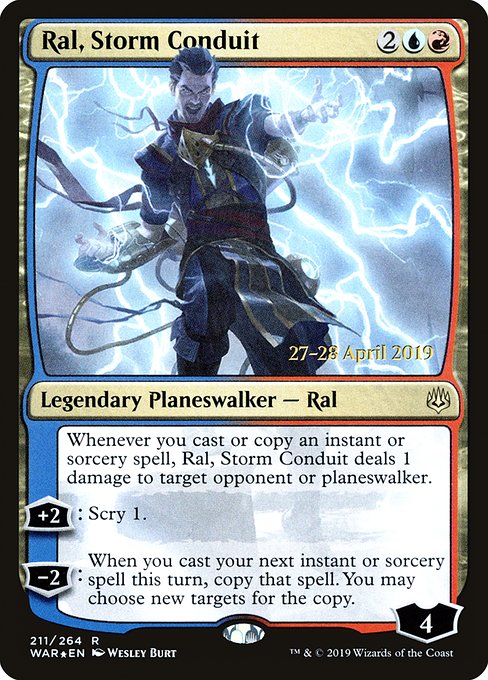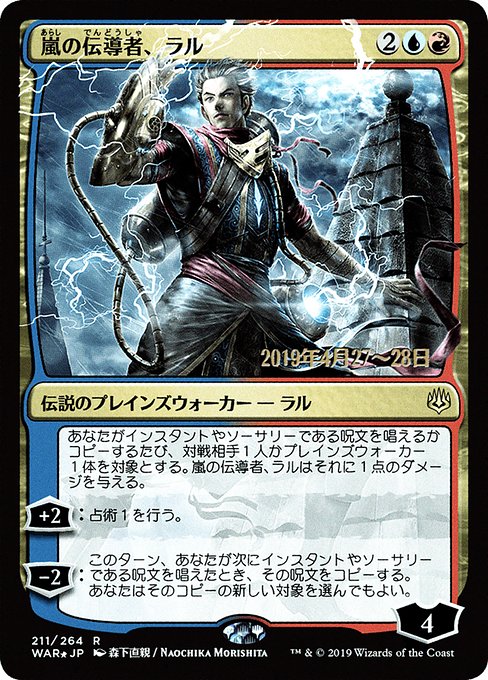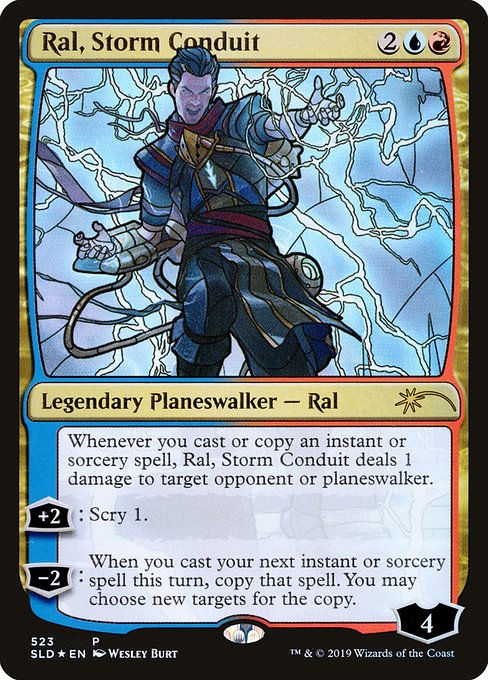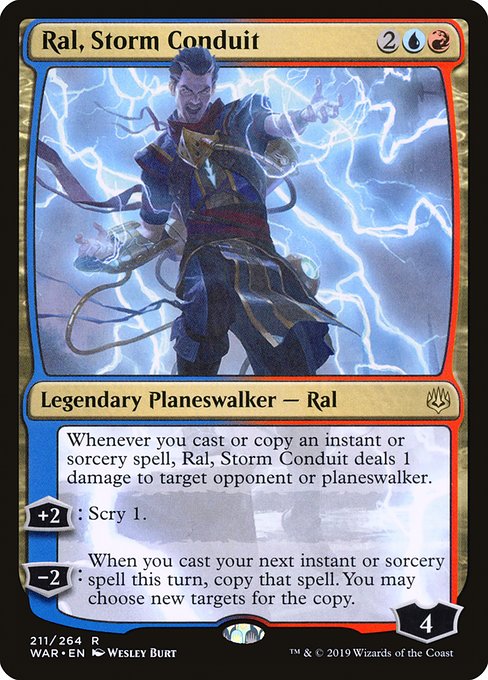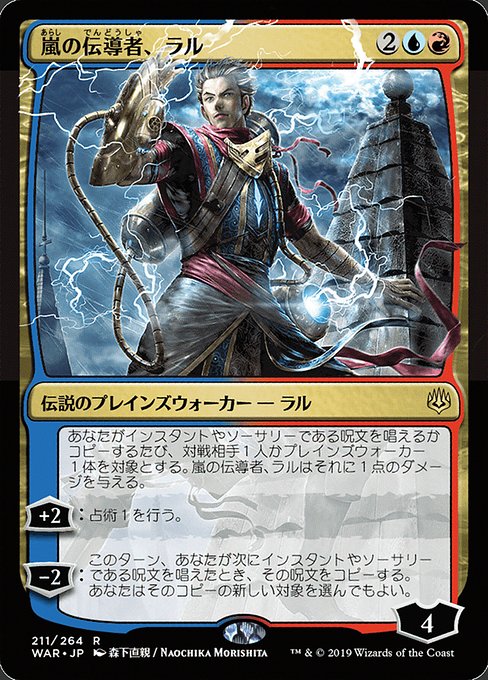Ral, Meister der Stürme
Legendärer Planeswalker — Ral
Immer wenn du einen Spontanzauber oder eine Hexerei wirkst oder kopierst, fügt Ral, Meister der Stürme, einem Gegner oder Planeswalker deiner Wahl 1 Schadenspunkt zu.
+2: Hellsicht 1.
−2: Wenn du in diesem Zug deinen nächsten Spontanzauber oder deine nächste Hexerei wirkst, kopiere jenen Zauberspruch. Du kannst neue Ziele für die Kopie bestimmen.
+2: Hellsicht 1.
−2: Wenn du in diesem Zug deinen nächsten Spontanzauber oder deine nächste Hexerei wirkst, kopiere jenen Zauberspruch. Du kannst neue Ziele für die Kopie bestimmen.
standard
future
historic
gladiator
pioneer
explorer
modern
legacy
pauper
vintage
penny
commander
brawl
alchemy
paupercommander
duel
oldschool
premodern
Rulings
If an effect copies a spell multiple times, as Finale of Promise may, Ral’s first ability triggers that many times.
If the spell that’s copied is modal (that is, it says “Choose one —” or the like), the copy created by Ral’s last ability will have the same mode or modes. You can’t choose different ones.
If the spell that’s copied has damage divided as it was cast, the division can’t be changed (although the targets receiving that damage still can). The same is true of spells that distribute counters.
The copies that Ral’s last ability creates are created on the stack, so they’re not “cast.” Abilities that trigger when a player casts a spell won’t trigger.
You can’t choose to pay any additional costs for the copy created by Ral’s last ability. However, effects based on any additional costs that were paid for the original spell are copied as though those same costs were paid for the copy too.
Some spells instruct you to “copy target instant or sorcery spell.” Because a spell is never a legal target for itself, you can’t cast such a spell targeting itself to create a loop that causes Ral’s first ability over and over.
If an effect copies a card rather than a spell (such as that of God-Eternal Kefnet), this doesn’t cause Ral’s first ability to trigger. That ability will trigger if you cast the copy, however.
If the spell that’s copied is modal (that is, it says “Choose one —” or the like), the copy created by Ral’s last ability will have the same mode or modes. You can’t choose different ones.
If the spell that’s copied has damage divided as it was cast, the division can’t be changed (although the targets receiving that damage still can). The same is true of spells that distribute counters.
The copies that Ral’s last ability creates are created on the stack, so they’re not “cast.” Abilities that trigger when a player casts a spell won’t trigger.
You can’t choose to pay any additional costs for the copy created by Ral’s last ability. However, effects based on any additional costs that were paid for the original spell are copied as though those same costs were paid for the copy too.
Some spells instruct you to “copy target instant or sorcery spell.” Because a spell is never a legal target for itself, you can’t cast such a spell targeting itself to create a loop that causes Ral’s first ability over and over.
If an effect copies a card rather than a spell (such as that of God-Eternal Kefnet), this doesn’t cause Ral’s first ability to trigger. That ability will trigger if you cast the copy, however.
Rulings
If an effect copies a spell multiple times, as Finale of Promise may, Ral’s first ability triggers that many times.
If the spell that’s copied is modal (that is, it says “Choose one —” or the like), the copy created by Ral’s last ability will have the same mode or modes. You can’t choose different ones.
If the spell that’s copied has damage divided as it was cast, the division can’t be changed (although the targets receiving that damage still can). The same is true of spells that distribute counters.
The copies that Ral’s last ability creates are created on the stack, so they’re not “cast.” Abilities that trigger when a player casts a spell won’t trigger.
You can’t choose to pay any additional costs for the copy created by Ral’s last ability. However, effects based on any additional costs that were paid for the original spell are copied as though those same costs were paid for the copy too.
Some spells instruct you to “copy target instant or sorcery spell.” Because a spell is never a legal target for itself, you can’t cast such a spell targeting itself to create a loop that causes Ral’s first ability over and over.
If an effect copies a card rather than a spell (such as that of God-Eternal Kefnet), this doesn’t cause Ral’s first ability to trigger. That ability will trigger if you cast the copy, however.
If the spell that’s copied is modal (that is, it says “Choose one —” or the like), the copy created by Ral’s last ability will have the same mode or modes. You can’t choose different ones.
If the spell that’s copied has damage divided as it was cast, the division can’t be changed (although the targets receiving that damage still can). The same is true of spells that distribute counters.
The copies that Ral’s last ability creates are created on the stack, so they’re not “cast.” Abilities that trigger when a player casts a spell won’t trigger.
You can’t choose to pay any additional costs for the copy created by Ral’s last ability. However, effects based on any additional costs that were paid for the original spell are copied as though those same costs were paid for the copy too.
Some spells instruct you to “copy target instant or sorcery spell.” Because a spell is never a legal target for itself, you can’t cast such a spell targeting itself to create a loop that causes Ral’s first ability over and over.
If an effect copies a card rather than a spell (such as that of God-Eternal Kefnet), this doesn’t cause Ral’s first ability to trigger. That ability will trigger if you cast the copy, however.
Your collection? Your decks?
Want to manage your collection and/or create decks?


 0
0
 0.31€
0.31€
